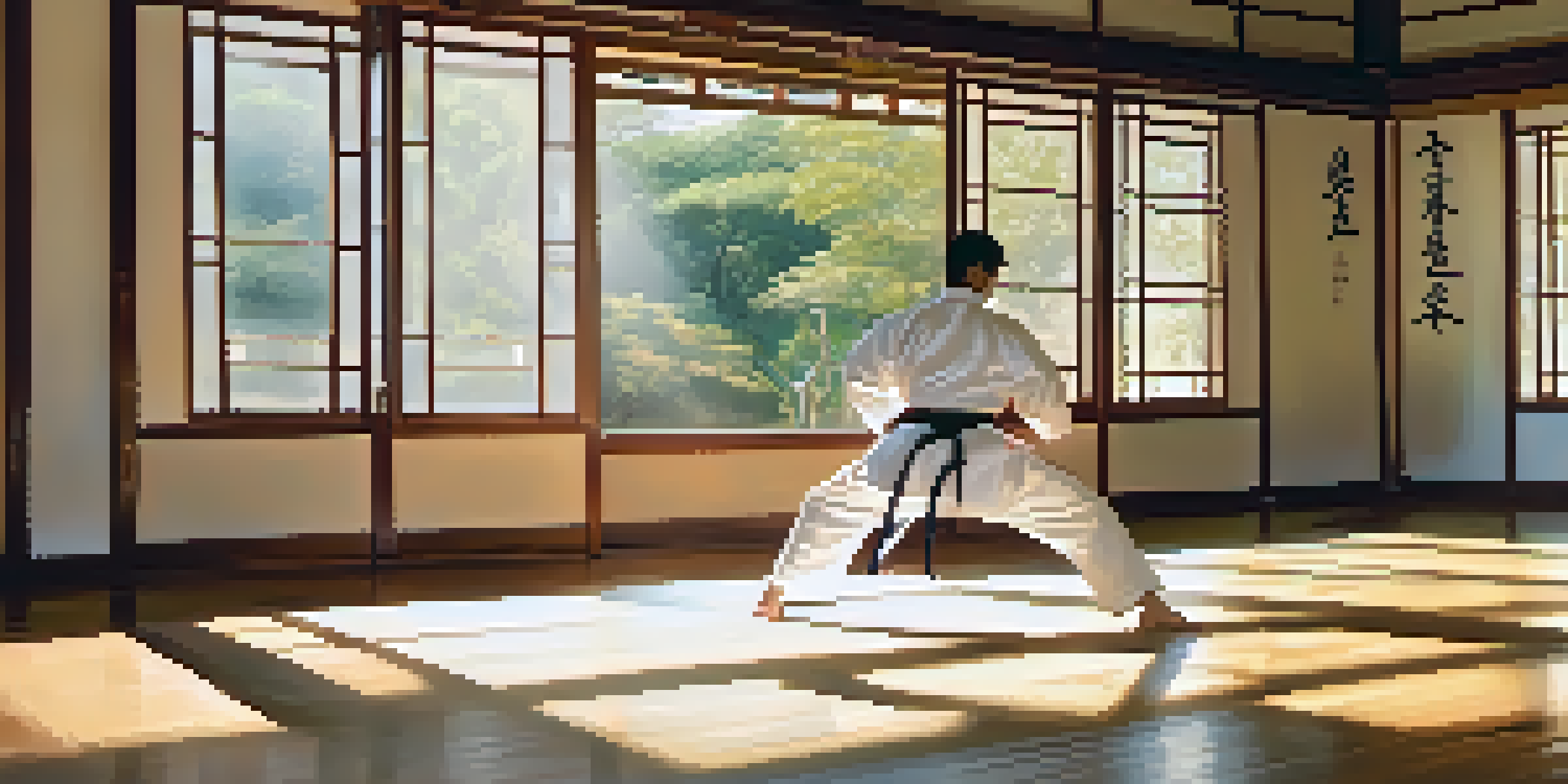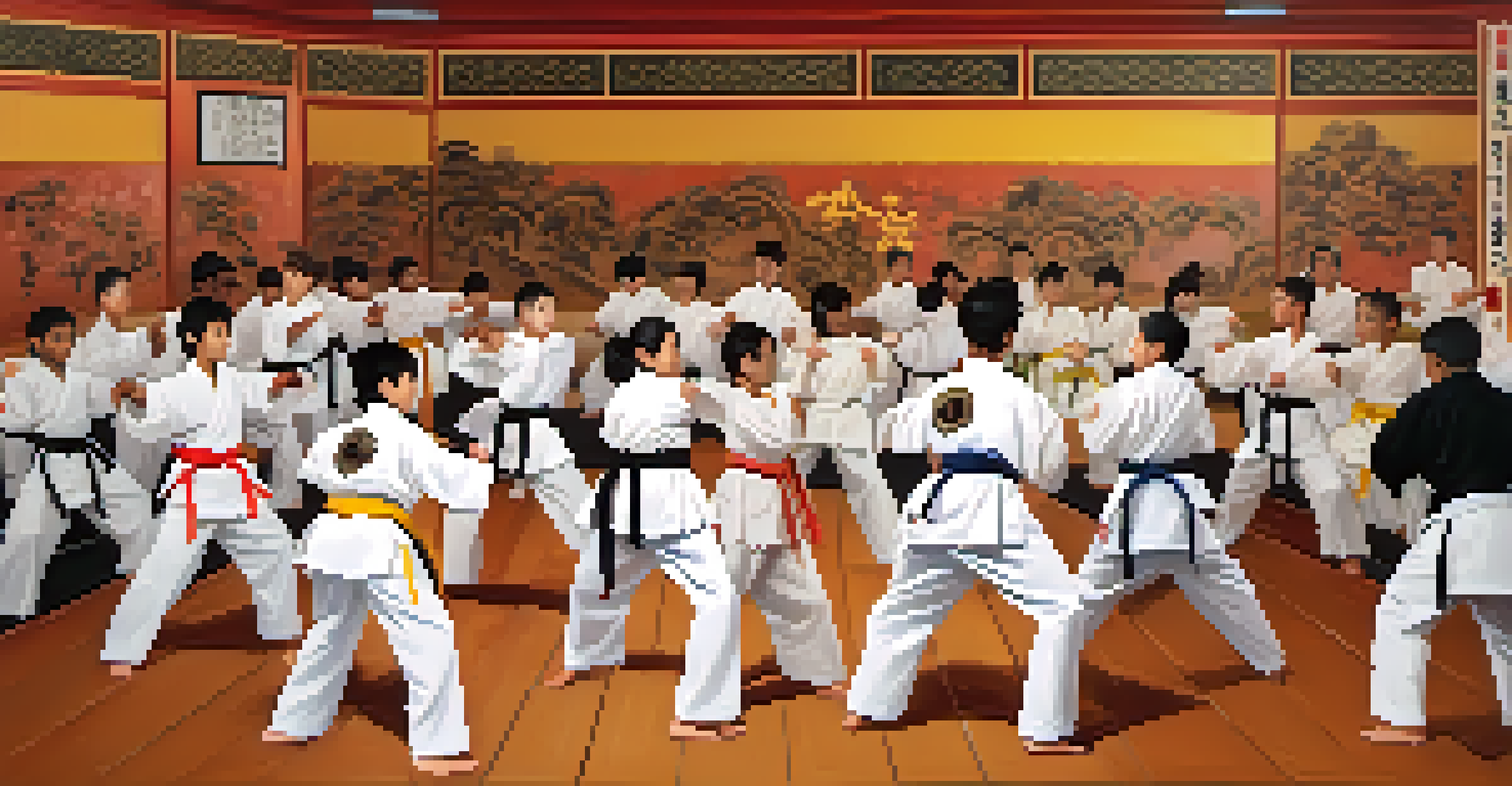Exploring the Connection Between Martial Arts and Mental Health

Martial Arts: More Than Just Physical Training
When we think of martial arts, images of physical combat often come to mind. However, martial arts encompass a holistic approach that nurtures both body and mind. Practitioners engage in techniques that enhance physical fitness, but they also cultivate mental resilience and focus. This multidimensional training encourages individuals to develop not just their martial skills, but also their emotional and psychological well-being.
The ultimate aim of martial arts is not having to use them.
For instance, the discipline required to master martial arts techniques fosters a sense of commitment and perseverance. These qualities can translate into various aspects of life, helping individuals tackle challenges with a more positive mindset. Additionally, the repetitive nature of training allows for mental clarity, giving practitioners a chance to process their thoughts and emotions in a structured environment.
Ultimately, martial arts serve as a powerful framework for personal development. By prioritizing mental health alongside physical prowess, practitioners can experience profound benefits that enhance their overall quality of life.
Stress Reduction Through Martial Arts Practice
One of the most significant benefits of martial arts is its ability to reduce stress. The focused movements and breathing techniques practiced in martial arts provide an outlet for releasing tension. Participants often find that immersing themselves in the rhythm of training helps clear their minds, promoting a sense of calm and relaxation.

Moreover, engaging in physical activity has been scientifically proven to boost endorphins, the body's natural mood lifters. This biochemical response can help alleviate feelings of anxiety and depression, making martial arts a practical tool for improving emotional stability. The act of hitting a punching bag or executing a kick can serve as a healthy way to channel frustrations and worries.
Holistic Benefits of Martial Arts
Martial arts promote not only physical fitness but also mental resilience and emotional well-being.
In essence, martial arts not only provide a physical workout but also cultivate emotional relief. Practitioners often leave the dojo or training space feeling rejuvenated and more equipped to handle the stresses of daily life.
Building Confidence and Self-Esteem in Martial Arts
Martial arts training is an excellent way to build self-confidence and enhance self-esteem. As practitioners progress through different techniques and earn belts, they experience a sense of accomplishment that fosters a positive self-image. Every new skill mastered or challenge overcome contributes to a growing belief in one's abilities.
Martial arts is not about fighting; it's about building character.
This boost in confidence can spill over into other areas of life, empowering individuals to face personal and professional challenges with greater assurance. For example, someone who may have struggled with public speaking might find that the discipline and self-control gained from martial arts give them the courage to express themselves more freely.
Ultimately, the journey through martial arts is not just about physical prowess; it's about personal growth. As confidence flourishes, practitioners often find themselves taking on new challenges, both on and off the mat.
Mindfulness and Presence in Martial Arts Training
Martial arts inherently promote mindfulness, a practice that encourages being present in the moment. During training, practitioners must concentrate entirely on their movements and surroundings, which can help quiet a busy mind. This focus creates a meditative state, allowing individuals to temporarily step away from their worries and anxieties.
Consider the act of performing a kata, or a series of movements: each step requires attention to detail, balance, and rhythm. This level of concentration can be a form of moving meditation, fostering a deeper connection to oneself. As practitioners engage in this mindful practice, they often develop greater awareness of their thoughts and feelings.
Stress Relief Through Movement
Engaging in martial arts helps reduce stress by channeling tension into focused physical activity.
Incorporating mindfulness into martial arts not only enhances the training experience but also contributes positively to mental health. By learning to be present, individuals can better manage stress and cultivate a sense of inner peace.
The Community Aspect of Martial Arts
Another vital component of martial arts is the sense of community it fosters. Practitioners often train in groups, creating bonds over shared experiences and goals. This camaraderie can lead to lasting friendships, providing a support system that enhances emotional well-being.
For many, the dojo becomes a second home where individuals feel accepted and valued. The encouragement from peers and instructors can be incredibly uplifting, helping practitioners push through challenges while knowing they are not alone. This social connection is essential for mental health, as it combats feelings of isolation and loneliness.
In conclusion, the community aspect of martial arts not only enriches the training experience but also plays a crucial role in supporting mental health. Engaging with others who share similar passions fosters a sense of belonging and connection that is invaluable.
Discipline and Mental Toughness in Martial Arts
Discipline is a cornerstone of martial arts training, and it significantly contributes to mental health. The process of learning and mastering techniques requires dedication and consistent effort. This commitment teaches practitioners valuable lessons about setting goals and following through, which can enhance their ability to tackle life's challenges.
Moreover, the mental toughness developed through martial arts can help individuals cope with adversity. Facing physical challenges during training—like sparring or completing a difficult routine—builds resilience that can be applied to everyday obstacles. Practitioners learn that perseverance is possible, and this mindset can help them navigate stressors more effectively.
Community and Support in Training
The camaraderie found in martial arts fosters lasting friendships and provides essential emotional support.
In essence, martial arts instills a strong sense of discipline and mental fortitude that extends beyond the dojo. Practitioners often find themselves better equipped to approach life with determination and a can-do attitude.
The Therapeutic Benefits of Martial Arts
Martial arts can be an effective form of therapy for individuals dealing with various mental health issues. Many people find that the structured environment of martial arts training provides a safe space to confront their challenges. Whether managing anxiety, depression, or trauma, martial arts can offer a therapeutic outlet for healing.
Classes often emphasize respect, humility, and personal growth, creating a supportive setting conducive to emotional exploration. The physical activity itself can also lead to improvements in mood and emotional regulation, making it a valuable addition to traditional therapeutic practices. Many therapists even recommend martial arts as a complementary approach to mental health treatment.

Ultimately, the therapeutic benefits of martial arts highlight its potential to foster mental well-being. By combining physical activity with emotional support, martial arts can be a powerful tool for those seeking to improve their mental health.